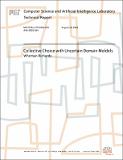Collective Choice with Uncertain Domain Moldels
Author(s)
Richards, Whitman
DownloadMIT-CSAIL-TR-2005-054.ps (17376Kb)
Additional downloads
Metadata
Show full item recordAbstract
When groups of individuals make choices among several alternatives, the most compelling social outcome is the Condorcet winner, namely the alternative beating all others in a pair-wise contest. Obviously the Condorcet winner cannot be overturned if one sub-group proposes another alternative it happens to favor. However, in some cases, and especially with haphazard voting, there will be no clear unique winner, with the outcome consisting of a triple of pair-wise winners that each beat different subsets of the alternatives (i.e. a “top-cycle”.) We explore the sensitivity of Condorcet winners to various perturbations in the voting process that lead to top-cycles. Surprisingly, variations in the number of votes for each alternative is much less important than consistency in a voter’s view of how alternatives are related. As more and more voter’s preference orderings on alternatives depart from a shared model of the domain, then unique Condorcet outcomes become increasingly unlikely.
Date issued
2005-08-16Other identifiers
MIT-CSAIL-TR-2005-054
AIM-2005-024
Series/Report no.
Massachusetts Institute of Technology Computer Science and Artificial Intelligence Laboratory
Keywords
AI, collective choice, uncertainty, voting, top-cycles